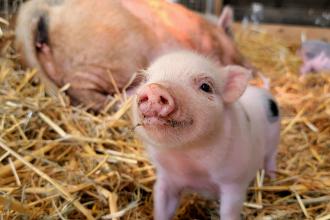Re: Justice, rights, and unnecessary suffering
Livestock are subject to crowding and sensory deprivation and must be killed to provide meat. Dr Hajek proposed that we extend promotion of human rights to animals, because cattle and pigs have complex cognitive and emotional lives.[1] I agree.[2]
There are also environmental and health reasons to eat mostly plant-derived food. It takes 4 kg of grain to produce 1 kg of pork,[3] and 7 kg of grain to produce 1 kg of beef.[4] Carbon dioxide is produced by burning oil or gas to produce fertilizer, to pump water for irrigation, and to power farm machinery. The cattle industry is a major source of methane, a potent greenhouse gas.[5] Human-caused climate change is contributing to the drought affecting western North America.[6] Eating less animal-derived food decreases our environmental footprint.
Human disease can be caused by manure-contaminated runoff getting into water sources, as happened in Walkerton, Ontario.[7] Antibiotics are used in raising livestock. This practice accelerates the development of antibiotic-resistant bacteria and can transfer antibiotic-resistant bacteria to humans.[8] Animal-derived foods are calorie-dense, expensive, easily digested, and a major source of cholesterol. The current Canadian lipid guidelines recommend the Mediterranean diet, which contains little meat, to help lower cholesterol.[9]
—Robert Shepherd, MD
Victoria
This letter was submitted in response to “Justice, rights, and unnecessary suffering.”
hidden
 |
| This work is licensed under a Creative Commons Attribution-NonCommercial-NoDerivatives 4.0 International License. |
References
1. Hajek J. Justice, rights, and unnecessary suffering. BCMJ 2023;65:280-281.
2. Broom DM, Sena H, Moynihan KL. Pigs learn what a mirror image represents and use it to obtain information. Anim Behav 2009;78:1037-1041.
3. Global Agriculture. Agriculture at a crossroads. Findings and recommendations for future farming. Accessed 18 December 2023. www.globalagriculture.org/report-topics/meat-and-animal-feed.html.
4. David Suzuki Foundation. Food and climate change. Accessed 18 December 2023. https://davidsuzuki.org/living-green/food-climate-change.
5. NASA Global Climate Action. Which is a bigger methane source: Cow belching or cow flatulence? Accessed 18 December 2023. https://climate.nasa.gov/faq/33/which-is-a-bigger-methane-source-cow-belching-or-cow-flatulence.
6. Overpeck JT, Udall B. Climate change and the aridification of North America. Proc Natl Acad Sci USA 2020;117:11856-11858.
7. Salvadori MI, Sontrop JM, Garg AX, et al. Factors that led to the Walkerton tragedy. Kidney Int Suppl 2009;75:S33-S34.
8. Arsène MMJ, Davares AKL, Viktorovna PI, et al. The public health issue of antibiotic residues in food and feed: Causes, consequences, and potential solutions. Vet World 2022;15:662-671.
9. Kolber MR, Klarenbach S, Cauchon M, et al. PEER simplified lipid guideline 2023 update: Prevention and management of cardiovascular disease in primary care. Can Fam Physician 2023;69:675-686.

